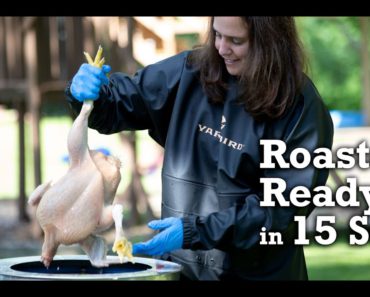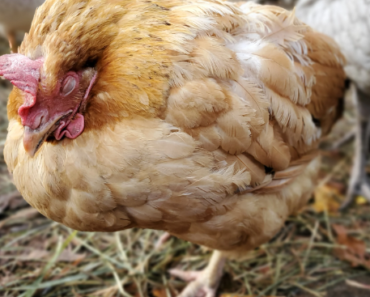Contents
- 1 Raising Turkeys with Chickens: A Comprehensive Guide to Successful Co-Existence
- 2 Can You Raise Turkeys with Chickens?
- 3 FAQ
- 3.1 Can you raise turkeys with chickens in the same coop or should they be kept separate?
- 3.2 What are the potential benefits and risks of raising turkeys alongside chickens in terms of health and disease prevention?
- 3.3 Are there any special considerations or management practices that one should follow when raising turkeys and chickens together, such as diet requirements or housing needs?
- 3.4 Related Posts

Are you a poultry farmer wondering if you can raise turkeys alongside chickens? This article aims to provide valuable insights into the compatibility of these two bird species. We will explore important factors such as housing, feeding, and disease management, enabling you to make informed decisions and maximize your flock’s well-being. Discover the possibilities and challenges of raising turkeys and chickens together in this comprehensive guide.
Raising Turkeys with Chickens: A Comprehensive Guide to Successful Co-Existence
Raising Turkeys with Chickens: A Comprehensive Guide to Successful Co-Existence provides valuable insights into the successful integration of turkeys and chickens in a shared environment. This guide offers comprehensive information, tips, and strategies to ensure a harmonious coexistence between these two poultry species.
Why Raise Turkeys with Chickens?
Integrating turkeys and chickens can be beneficial for several reasons. First, they can share the same living space, which optimizes land usage and reduces the need for separate housing. Second, their different feeding habits complement each other, allowing for better utilization of food resources. Lastly, having both species together can enhance overall security, as they can alert each other to potential dangers.
Choosing Compatible Breeds
When raising turkeys and chickens together, it is crucial to select compatible breeds. Some chicken breeds are more docile and adaptable, making them suitable companions for turkeys. Additionally, certain turkey breeds are known to be less aggressive and can coexist peacefully with chickens.
Providing Adequate Space
To ensure a successful coexistence, ample space is essential. Both turkeys and chickens require sufficient room to roam, roost, and establish their territories. Providing separate areas for nesting and roosting can help minimize conflicts and promote a peaceful environment for both species.
Managing Feed and Nutrition
Feeding turkeys and chickens involves understanding their distinct dietary requirements. While chickens thrive on grain-based feeds, turkeys require higher protein levels. Offering separate feeding stations or using feeders designed to accommodate both species can help ensure they receive appropriate nutrition.
Ensuring Health and Disease Prevention
Maintaining good flock health is crucial for the well-being of both turkeys and chickens. Regular veterinary care, vaccination protocols, and biosecurity measures are essential to prevent the spread of diseases. Additionally, providing clean water sources, regular cleaning of living areas, and proper sanitation practices are key to promoting a healthy environment.
Handling Potential Challenges
Despite careful planning, challenges may still arise when raising turkeys with chickens. Turkeys can be more susceptible to specific diseases, such as blackhead disease, which can affect chickens indirectly. Separating sick or injured birds promptly and implementing appropriate biosecurity measures can help mitigate these challenges.
Conclusion
Raising turkeys with chickens can be a rewarding endeavor when done correctly. This comprehensive guide provides the necessary information to successfully integrate and maintain a harmonious coexistence between these two poultry species. By understanding their needs, providing adequate space, managing nutrition, ensuring flock health, and addressing potential challenges, you can create a balanced and thriving environment for both turkeys and chickens.
Can You Raise Turkeys with Chickens?
1. The Compatibility of Raising Turkeys and Chickens
Raising turkeys and chickens together is possible, but there are important factors to consider for a successful integration. It’s essential to evaluate the temperament, size, and needs of both species before attempting to house them together.
2. Housing Requirements for Turkeys and Chickens
When housing turkeys and chickens together, it’s crucial to provide sufficient space and suitable conditions for both species. Turkeys require more room and higher roosts compared to chickens. Adequate ventilation, nesting areas, and protection from predators are also essential.
3. Feeding and Care for Turkeys and Chickens
Turkeys and chickens have different dietary requirements, so it’s important to provide separate feeders to ensure appropriate nutrition for each species. Turkeys require higher protein levels, and their feed may contain medications specific to their needs. Regular health checks and appropriate vaccinations are necessary to maintain the well-being of both turkeys and chickens.
FAQ
Can you raise turkeys with chickens in the same coop or should they be kept separate?
It is generally recommended to keep turkeys and chickens separate. While they can coexist peacefully in some cases, there are a few reasons why it’s best to keep them apart:
1. Size Difference: Turkeys are much larger than chickens and can unintentionally harm or injure them, especially during mating or territorial disputes.
2. Disease Control: Turkeys and chickens are susceptible to different diseases, and keeping them together increases the risk of cross-contamination. Some diseases that affect turkeys, such as blackhead, do not affect chickens, but can be fatal to turkeys.
3. Feed Requirements: Turkeys have different nutritional needs compared to chickens. Feeding them the same diet may not provide adequate nutrition for either species.
If you do decide to keep turkeys and chickens together, make sure the coop is spacious enough to accommodate both, providing separate roosting areas and ensuring the turkeys have ample space to move around without crowding the chickens. Regular monitoring for signs of aggression, health issues, and disease prevention is crucial in this case. However, it is generally recommended to keep them separate to minimize potential risks.
What are the potential benefits and risks of raising turkeys alongside chickens in terms of health and disease prevention?
Raising turkeys alongside chickens can have both benefits and risks in terms of health and disease prevention.
Benefits:
1. Disease surveillance: Raising different poultry species together can help increase disease surveillance. If a disease outbreak occurs in one species, it can be detected earlier, allowing for prompt intervention and prevention in the other species.
2. Diversification of farm income: Raising turkeys alongside chickens can provide additional revenue streams for the farm. Different markets may exist for turkey products, such as meat or eggs, which can diversify the farm’s income sources.
3. Insect and pest control: Turkeys are known to be excellent insect and pest controllers. They can help reduce populations of various pests that may affect both turkeys and chickens, such as flies or ticks.
Risks:
1. Increased disease transmission: Raising different poultry species together can increase the risk of disease transmission between them. Some diseases can affect both turkeys and chickens, and having them in close proximity can facilitate the spread of pathogens.
2. Competitive behavior: Turkeys and chickens may exhibit competitive behavior when sharing the same space. This can lead to aggression, stress, and potential injuries among the birds.
3. Different nutritional requirements: Turkeys and chickens have different nutritional requirements. If not properly managed, providing a balanced diet for both species can be challenging and may result in nutritional deficiencies or excesses.
Raising turkeys alongside chickens can provide benefits such as increased disease surveillance, diversified income, and pest control. However, it also carries risks such as increased disease transmission, competitive behavior, and differing nutritional requirements. Proper management and biosecurity measures are crucial to mitigate these risks and ensure the health and well-being of both species.
Are there any special considerations or management practices that one should follow when raising turkeys and chickens together, such as diet requirements or housing needs?
When raising turkeys and chickens together, there are a few considerations to keep in mind:
Diet: While chickens and turkeys have similar dietary requirements, there are some differences. Turkeys require a higher protein diet compared to chickens, especially during the first few weeks of life. It’s important to provide them with a balanced feed that meets their specific nutritional needs.
Housing: Turkeys are larger and more active than chickens, so they require more space. The housing should be designed to accommodate both species comfortably. Ensure that the shelter is secure and predator-proof, as turkeys can attract more attention from predators due to their size.
Health: Turkeys and chickens can be susceptible to different diseases, so it’s essential to manage their health separately. Consult with a veterinarian to develop an appropriate vaccination and health plan for each species.
Behavior: Turkeys and chickens have different behaviors and may not always get along well. Observing their interactions is important, and if necessary, separate them to prevent aggression or injury.
Compatibility: Not all chicken breeds are suitable for cohabitating with turkeys. Some chickens may peck at the turkeys or show aggressive behavior towards them. Choose chicken breeds known to be compatible with turkeys or consider raising them separately.
It’s possible to raise turkeys and chickens together, but specific considerations for diet, housing, health, behavior, and compatibility are crucial to ensure their well-being.
raising turkeys with chickens can be a feasible option for poultry enthusiasts. While there are considerations to be made regarding the different needs and behaviors of these birds, successful cohabitation is indeed possible. By ensuring sufficient space, accommodating dietary requirements, and observing flock dynamics, keeping turkeys and chickens together can offer benefits such as enhanced pest control and social interaction. However, it’s important to monitor the health and well-being of both species closely, as they may require specific care or separate housing at times. Overall, integrating turkeys with chickens can be a rewarding experience, offering a diverse and harmonious backyard flock.





